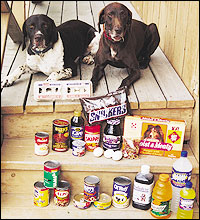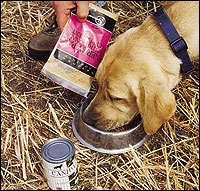Some gun dogs need a boost in the field. If your dog occasionally works himself out of his appetite, read on.
By Jerry Thoms
 For many dogs, these supplemental foods and drinks are not needed. But the author has tried all the products on his hard-hunting gun dogs to his satisfaction. |
"My gun dog drives me crazy," I overheard a hunter say last fall. "Every time I take her hunting for a day or two she loses about 25 percent of her body weight. In the morning she's too excited to eat her usual dry dog food and in the evening she's too pooped to eat anything. After a couple of days of this during a hunting trip, she's hardly able to hunt at all. And it takes her a week or more to recover from this experience."
Does this sound familiar? Your dog might benefit from some nutritional supplements while working hard during the waterfowl or upland gamebird season. Or will such supplemental nutrients, added on to a regular dry-food diet, throw your dog's normal metabolism out of balance, cause new problems, maybe create possible health threats for your canine?
"You're feeding boiled eggs and baked potatoes to your German shorthair pointers?" an English setter owner said to me, in a surprised and sort of accusing tone. At the time, we were taking a mid-morning break out on the western plains of South Dakota during the September opening of the prairie grouse season. And I was giving my two pointers their usual 10:00 a.m. snack at the same time that I was having a cup of coffee and a sandwich. "You're not supposed to feed hunting dogs anything but their regular dry dog food," he lectured me. "You'll throw their nutritional balance out of whack with between meal goodies like these. Your dogs will end up with dangerous energy surges. They'll get sick. Their stomachs will bloat. They might die," he warned me.
His own dog, obviously in well-maintained physical condition, was standing in her dog crate ready to return to the wide-open spaces in pursuit of sharptails and prairie chickens for which we had been hunting hard for the last three hours. My two dogs, though not pooped out, were worn-down by having already run, in my guess, 20 miles of open country defined by hills, gullies, endless pastures and bottomless ravines all covered by a sea of knee-to-chin high prairie grass. They ate their hard boiled eggs and cooked potatoes with enthusiasm, then caught cat-naps, while we all rested for an hour before our return to hunting.
"Now you're giving your dogs peanut butter and jelly sandwiches!" my hunting partner later commented at 3:30 that afternoon, an hour before we headed off to find one last bird to fill our mixed bag limit of "sharpies" and "chickens." "Your dogs eat better than I do," he decided. "And, all these snacks sure don't seem to hurt them," he added as he lifted his exhausted setter into her dog crate where she collapsed in a ragged heap.
The next morning his setter and my two shorthairs hit the ground with their wheels spinning and their motors running full blast. But, by 10:30 during our first extended rest period, my friend's dog was mostly walking, and walking very slowly back to the truck. "She just may be a little tired," her owner said. "She just may be really hungry," I decided as I watched her drool as she watched my dogs chow down on their boiled eggs and canned meat.
DON'T STARVE YOUR GUN DOG
"Don't unintentionally starve your gun dog during the hunting season," is the advice of Jim Reiser, a D.V.M. and an upland gamebird hunter from Franksville, Wisconsin. Dr. Rieser's opinion on nutritional supplements for hardworking hunting dogs is based on his professional background as a veterinarian. But, just as significant, his advice comes from more than 20 years of experience in hunting his "Shooting Star" line of German shorthair pointers and running those same dogs in the various events of the North American Versatile Hunting Dog Association, in National Shoot to Retrieve competitions and in AKC Hunt Tests.
FORGET THE "OLD DAYS"
"In the old days, the standard attitude among hunters was to feed their dogs once every 24 hours, then work them hard all day without another scrap of food at any time during that period. Even the toughest gun dog can't take much of this. And that's why in the past so many dogs looked so bony and gaunt and acted so worn-out and tired halfway through the season," in Rieser's estimation. Feed your gun dog more often "There is a growing recognition among many gun dog owners that feeding a dog more during a single day of hunting and through the whole hunting season is a good idea and not necessarily dangerous for most canines," Rieser has concluded. "Double, maybe triple your dog's rations and certainly increase the quality of your dog's food by adding more highly digestible protein, greater quantities of calorie-laden fat and some quick-energy carbohydrates if your dog is hunting hard every day," Rieser suggests.
 Meat-based canned dog foods combined with a special energy supplements can be a convenient way to give a hardworking hunting dog an energy boost. |
KNOW YOUR DOG BEFORE YOU ADD SUPPLEMENTS
"Calculate their increases according to what you personally know about your particular dog's metabolism, level of exercise and personal past experiences with these 'extra' nutrients. In other words, experiment with these nutritional supplements at home before you head to the field with them," Rieser warns all owners of hardworking hunting dogs.
DON'T "SURPRISE" YOUR GUN DOG
Don't "surprise" your dog with any nutritional supplements whether protein- fat- or carbohydrate-based energy foods, Rieser warns all owners of hard-working gun dogs. "I've learned the hard way from past experiences not to 'suddenly' give any new and different food to a hunting dog. Especially not in the middle of a hunt when that pooch is just a little weary or flat-out dead tired because this can create an intestinal disaster. Many foods rich in tasty calories may be a shock to your dog's system, a shock that can lead to anything from mild up-chucks to full-blown diarrhea."
"To prepare your pooch for nutritional supplements given during the hunting season, start 'testing' for what works best by way of food groups while you're exercising your dog in the summer," Rieser recommends. "Try meat and potatoes or eggs and cheese a couple hours before or 30 minutes after a run in the country or swim in a pond then watch to see what happens. Find out what you dog likes best and what he or she responds to with the greatest benefits."
R AND R
"Cool off hot dogs and rest up tired dogs and give them adequate water before you feed them anything in the field or duck blind," Rieser says. "T
hen give them some time to digest their food before sending them back to work. This way you'll have dogs less likely to experience intestinal discomforts. Those gun dog owners who worry about bloat or stomach tension shouldn't have any problems if they follow this rest-and-relaxation procedure before and after feeding their dogs any time," Rieser believes.
| WARNING-DON'T TRY THIS AT HOME | 

If you choose to use some kind of nutritional supplements for your dog on a hunting trip, don't try anything without first experimenting with it at home, preferably well before the hunting season. And do this while you're getting your pooch in physical shape for upland gamebird or waterfowl hunting.
Every dog is different, so every dog under physical stress will have his or her own way of reacting to increased quantities of protein, fats and carbohydrates. Find out how your dog will eat and respond to supplemental food.
|
|
CHOOSE "TASTY"NUTRITIONAL SUPPLEMENTS
"Tune up your gun dog's regular rations with savory nutritional supplements especially for hunting dogs that act too worn out and weary to eat anything," Rieser suggests. "One of my hunting partners has a dog that wouldn't eat any of his dry dog food during the first two days on a hunting trip," Rieser says. "The dog was just too worn out to have an appetite, and by the third day he was too physically exhausted to do much hunting. So, we added to his regular food a dried-meat dog food, some canned chicken noodle soup and a few cooked fat-trimmings off a T-bone steak. What a world of difference that made in the dog's willingness to eat his food and to better perform in the field the next day," Rieser points out.
SOME GENERAL SUGGESTIONS
In nearly four decades of owning hunting dogs and hunting with other dogs and their owners, I have some observations on adding nutritional supplements to the diets of these dogs during hunting season. Make your own nutritional supplements or buy commercially available products. Cooked meat and vegetables are relatively easy to prepare and almost always popular with gun dogs no matter how excited or tired they may be. Keeping and carrying homemade stew, however, can be an inconvenience. Boiled eggs or peanut butter and jelly sandwiches on wholewheat bread are less trouble to store and transport, but these food items don't always have the tempting odor of meat as a way to trigger a reluctant appetite.
Store-bought canned dog food, with a meat base and added vegetables cooked and ready to eat, is usually an irresistible supplement poured on dry dog food. With some hot water added to release meaty odors and flavors, most canines, no matter how wound-up or pooped out, will eat the meat and their dry dog food, too.
Several dog food companies produce a line of canned dog foods and a couple of major dog-food manufacturers also make "moist and meaty" meat and cheese combinations put in cellophane packages. Gun dog owners can carry these packets into the duck boat or pheasant field, open them without any special tools, and feed their dogs whenever necessary.
With some at-home experimentation and practice, most all gun dog owners should be able to find some supplements that their pooch will eat no matter what the circumstances. And with the exercise of common sense and appropriate caution those who hunt their gun dogs hard should have better results while in pursuit of upland game and waterfowl.






